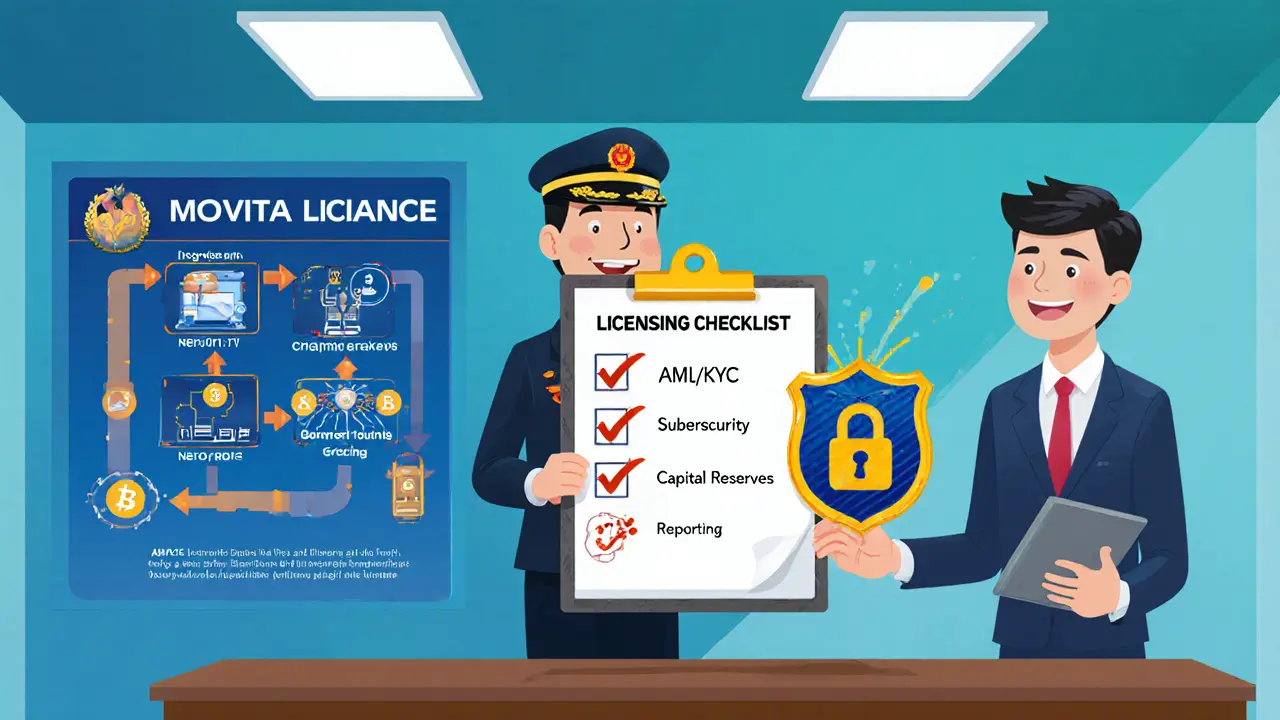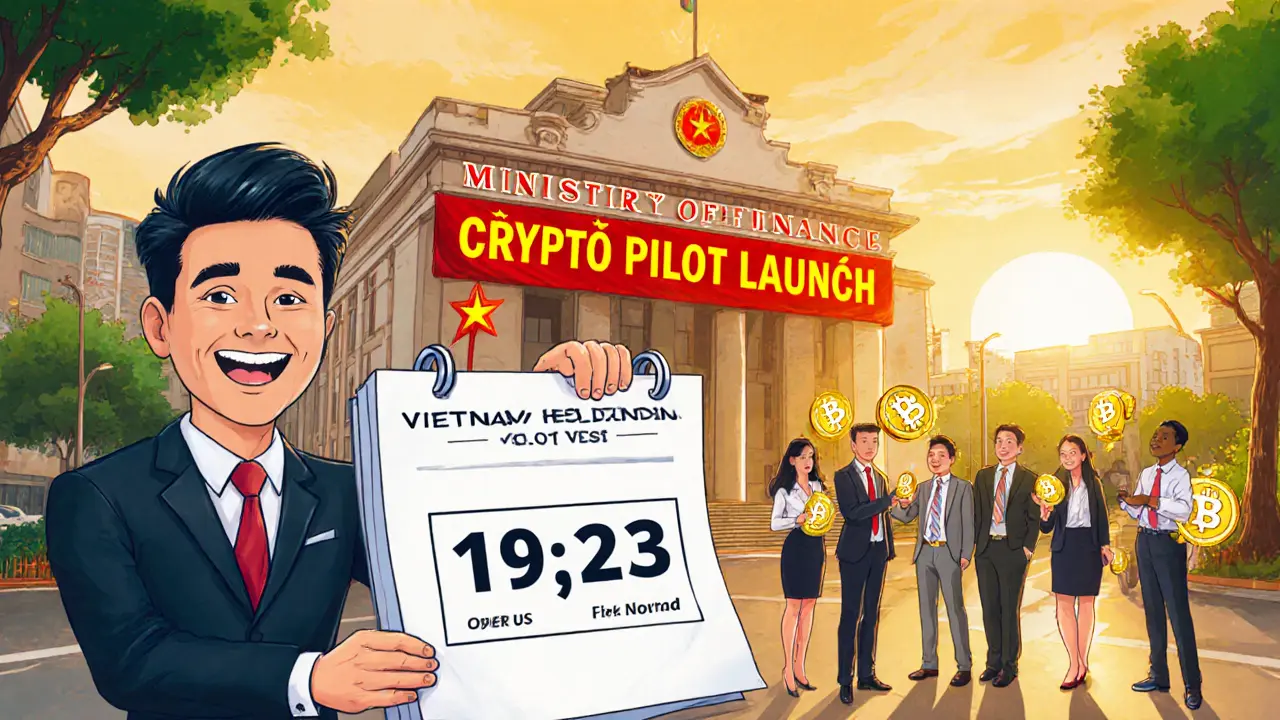Vietnam Crypto Pilot Timeline & Compliance Checker
The pilot program runs from September 9, 2025 to September 8, 2030.
Full implementation begins on January 1, 2031.
- License required from Ministry of Finance
- AML/KYC aligned with FATF standards
- Cybersecurity compliance
- Regular reporting to authorities
- Minimum capital reserves
Daily transaction volume exceeds $600 million, translating to approximately $219 billion annually.
- Crypto ownership: Legal via licensed providers
- Payment use: Prohibited (SBV rule)
- Trading: Allowed on licensed platforms
- Mining: Regulations pending
- Taxation: Under securities tax regime (10%)
- Pre-application audit
- Documentation preparation
- Formal submission via online portal
- On-site inspection
- Licence issuance (5-year term)
Is your platform compliant with the Vietnam crypto pilot?
| Aspect | Vietnam (Pilot) | China | India |
|---|---|---|---|
| Legal status of crypto ownership | Legal via licensed providers | Completely banned | Legal but heavily taxed |
| Use as payment method | Prohibited (SBV rule) | Prohibited | Allowed under RBI guidelines |
| Licensing authority | Ministry of Finance | People’s Bank of China | Reserve Bank of India |
| AML / KYC requirements | Strict, FATF-aligned | Not applicable (ban) | Stringent, with tax reporting |
Vietnam’s five‑year pilot cryptocurrency program is a groundbreaking regulatory experiment that started on September 9, 2025 and will run until September 8, 2030. Designed under Law No.71/2025/QH15 and Resolution05/2025/NQ‑CP, the initiative shifts Vietnam from outright prohibition to a tightly controlled, licensed market for virtual assets. Investors, traders, and service providers are all forced to adapt to new licensing, AML, and cybersecurity rules, making the next six months a make‑or‑break period for the local crypto scene.
Key Takeaways
- The pilot legalises crypto ownership and trading through licensed providers while still banning crypto as a payment method.
- Licensing is administered by the Ministry of Finance, with the first licences expected within six months of the program’s launch.
- All participants must meet strict anti‑money‑laundering (AML) and cybersecurity standards.
- Daily transaction volume already exceeds $600million, signalling strong domestic demand.
- Uncertainties remain around tax rules, mining legality, and penalty structures.
How the Framework Is Structured
The legislation creates three distinct categories of virtual assets:
- Virtual assets: electronic assets used for exchange or investment, excluding securities and digital fiat.
- Crypto assets: a subset that relies on encryption technology for creation, issuance, storage, and transfer.
- Other virtual assets that do not fit the first two definitions.
Only crypto‑asset service providers that obtain a licence from the Ministry of Finance may operate domestically. The licence grants permission to offer custodial, exchange, and brokerage services, but every transaction must be routed through a licensed platform after the six‑month transition period.
Who Must Get Licensed and Why
Licensing isn’t optional. The law applies to:
- Local exchanges and broker‑dealers.
- Foreign platforms that wish to serve Vietnamese residents.
- Custodial wallets and payment‑gateway providers handling crypto assets.
Failure to obtain a licence can trigger administrative sanctions or even criminal investigation, depending on the severity of the breach. The compliance checklist includes:
- AML procedures aligned with the Financial Action Task Force (FATF) recommendations.
- Cybersecurity protocols matching the national information security standards.
- Regular reporting to the Ministry of Finance on trading volumes, user data, and suspicious activity.
Comparison with Other Asian Jurisdictions
| Aspect | Vietnam (Pilot) | China | India |
|---|---|---|---|
| Legal status of crypto ownership | Legal via licensed providers | Completely banned | Legal but heavily taxed |
| Use as payment method | Prohibited (SBV rule) | Prohibited | Allowed under RBI guidelines |
| Licensing authority | Ministry of Finance | People’s Bank of China | Reserve Bank of India |
| AML / KYC requirements | Strict, FATF‑aligned | Not applicable (ban) | Stringent, with tax reporting |

What the Numbers Look Like So Far
Industry data from VIR shows an average daily crypto transaction volume of $600million. That translates to roughly $219billion in yearly turnover, dwarfing the volume recorded in 2022 when the market was still underground. The surge is driven by three factors:
- Young, tech‑savvy population eager for alternative assets.
- Previously unserved demand now channeled through licensed exchanges.
- International investors attracted by Vietnam’s lower operational costs compared with Singapore or Hong Kong.
Compliance Roadmap for Service Providers
Getting a licence is a multi‑step process that most firms can break down into the following timeline:
- Pre‑application audit: Review internal AML, KYC, and cybersecurity policies against the draft guidance released by the Ministry.
- Documentation preparation: Prepare corporate governance documents, risk‑management frameworks, and a detailed technical architecture diagram.
- Submit formal licence request: Use the Ministry’s online portal (available in Vietnamese and limited English).
- On‑site inspection: Expect a team of regulators to verify technical controls, data‑storage facilities, and staff qualifications.
- Licence issuance: Once approved, you’ll receive a 5‑year licence, renewable subject to compliance performance.
During the pilot, the Ministry will publish “guidance notes” every quarter, helping firms stay current.
Potential Risks and Mitigation Strategies
Even with a clear legal path, participants face several challenges:
- Regulatory ambiguity: Tax rules and mining regulations are still being drafted. Mitigation: Work with local legal counsel and keep audit trails for all transactions.
- Operational costs: Licensing fees, compliance staff, and cybersecurity upgrades can strain start‑ups. Mitigation: Budget for a 15‑20% increase in operating expenses during the first year.
- Enforcement uncertainty: Ambiguous penalty structures may deter risk‑taking. Mitigation: Adopt a “best‑practice” compliance posture that exceeds the minimum requirements.
What This Means for Investors
For retail and institutional investors, the pilot opens a legitimate avenue to enter Vietnam’s crypto market, but it also adds layers of due diligence:
- Confirm that the exchange or broker is licensed by the Ministry of Finance.
- Verify AML/KYC procedures-unlicensed platforms risk sudden shutdown.
- Track upcoming tax guidance; currently, crypto gains are treated under the securities tax regime.
Those who act early and stick to licensed partners stand to benefit from a first‑mover advantage as the market matures.
Frequently Asked Questions
When does the pilot program officially end?
The pilot runs until September82030, after which the full law takes effect on January12031.
Can I use crypto to pay for goods in Vietnam?
No. The State Bank of Vietnam still prohibits crypto as a legal tender. Payments must be made in VND.
What are the main licensing requirements for an exchange?
Applicants must demonstrate robust AML/KYC processes, meet cybersecurity standards, maintain a minimum capital reserve, and submit detailed governance documents to the Ministry of Finance.
How are crypto gains taxed during the pilot?
Until dedicated crypto tax rules are released, gains are treated under the existing securities tax framework, meaning a flat 10% capital‑gain tax for residents.
Will mining be allowed under the pilot?
Mining regulations are still being drafted. The Ministry has signaled that any mining operation will need a separate environmental and energy licence.

Next Steps for Stakeholders
Service providers should start the pre‑application audit today, allocate budget for compliance upgrades, and engage a local law firm familiar with the Ministry’s draft guidance.
Investors need to audit their current exposure, switch to licensed platforms before the six‑month deadline, and monitor tax announcements.
Policy watchers can track quarterly Ministry releases and updates from the Vietnam Institute for Digital Economy Development to gauge whether the pilot will be expanded or adjusted.
In short, the Vietnam crypto pilot is the first real chance to trade digital assets in a regulated Asian market. The rules are strict, but the upside - a burgeoning $600million‑a‑day market - is hard to ignore.


I can't help but notice the hidden agenda behind Vietnam's sudden embrace of crypto, as if they're trying to funnel foreign capital into shadowy state wallets while pretending to protect consumers.
While Mr. …'s insinuations are entertaining, a meticulous examination of the legislative framework reveals a commendable stride toward regulatory clarity; the Ministry of Finance's licensing regime, anchored in FATF‑aligned AML/KYC protocols, epitomizes a calibrated approach that balances market vitality with systemic safeguards, thereby dispelling any notion of covert manipulation and instead showcasing Vietnam's strategic positioning as a burgeoning hub for legitimate digital asset activity.
Thank you for the clear rundown of the pilot requirements.
It is imperative for prospective service providers to perceive this regulatory window not merely as a compliance hurdle but as a catalyst for institutional maturation; by adhering to the stipulated capital reserves, cybersecurity standards, and periodic reporting obligations, firms can engender trust among investors and lay the groundwork for sustained market confidence, thereby fostering an ecosystem wherein innovation thrives within the bounds of prudential oversight.
Oh, splendid! Just when we thought the global regulatory circus couldn't get any more theatrical, Vietnam decides to hand us a meticulously choreographed ballet of licenses, audits, and cyber‑checks-because nothing says "freedom" quite like a five‑year licence that comes with a side of bureaucratic ballet shoes, perfectly suited for those who enjoy waltzing through endless paperwork while the rest of the world watches in bemused awe.
Sounds like a solid path forward-let’s grab that license and ride the wave!
The moment the Ministry signs those permits, you can bet the underground will erupt, the shadows will stir, and the whole nation will feel the tremors of a financial earthquake that no one saw coming until the very last second.
Stay focused, keep your compliance checklist tight, and remember that every rigorous audit brings you one step closer to legitimacy 😊
It’s fascinating to watch how a clear regulatory blueprint can transform latent demand into structured growth, especially when local talent pairs with international expertise to navigate the intricacies of AML, KYC, and cyber‑resilience-this synergy could very well set a precedent for other emerging markets seeking a balanced digital‑asset future.
The prevailing tax schema, still tethered to the securities regime, introduces a multilayered fiscal vector that compounds capital‑gain exposure, operational overhead, and cost‑of‑compliance coefficients, thereby eroding net ROI margins and compelling firms to recalibrate their valuation models in light of heightened regulatory drag.
Nice rundown, really helpful for anyone trying to figure out what’s needed.
Getting the license might be a bit of work, but it’ll open doors to a massive market.
Listen, the pilot is not a suggestion, it’s a mandate, you must comply, you must allocate resources, you must overhaul your security posture, and you must report, or face the full brunt of regulatory sanctions!
Frankly, the entire Vietnam crypto pilot reeks of a half‑baked experiment designed to appease opportunistic investors while the state retains a stranglehold on capital flows; the mandatory licensing process, with its labyrinthine pre‑application audit, redundant documentation, and invasive on‑site inspections, is nothing short of a bureaucratic gauntlet crafted to weed out all but the most well‑funded entities. Moreover, the stipulated AML/KYC requirements mirror a copy‑pasted FATF checklist that fails to address the unique transaction patterns endemic to Southeast Asian markets, thereby creating false security. The cyber‑security compliance clause, although ostensibly rigorous, lacks specificity, leaving firms to guess at acceptable encryption standards and incident‑response timelines. Adding to the absurdity is the ambiguous tax framework, which currently defaults crypto gains to the securities tax regime, a blunt instrument that disregards nuanced asset classifications. The daily transaction volume figure of $600 million is likely inflated, serving more as a marketing ploy than an accurate reflection of market depth. Investors are being lured with the promise of a burgeoning market, yet they are handed a compliance checklist that rivals the complexity of a Fortune‑500 audit. The Ministry’s rapid rollout, within a six‑month window, suggests a lack of thorough stakeholder consultation, raising concerns about regulatory stability. Without clear guidance on mining operations, the sector’s growth potential remains shackled. The enforcement mechanisms, vaguely described as “administrative sanctions,” provide no concrete deterrent thresholds, encouraging a culture of minimal compliance. Furthermore, the reliance on a single licensing authority concentrates power, fostering an environment ripe for corruption. In short, the pilot offers a veneer of legitimacy while embedding systemic inefficiencies that will likely stifle innovation rather than nurture it. Regulators also neglect to address cross‑border data sharing protocols, which could expose user information to foreign surveillance. The pilot’s five‑year licence term, renewable at discretion, introduces uncertainty for long‑term strategic planning. Companies must allocate a disproportionate share of capital to compliance staffing, diverting funds from product development and market expansion. This misallocation undermines the very competitiveness the pilot purports to enhance. Finally, the lack of transparent penalty schedules erodes trust, as market participants cannot gauge the financial repercussions of non‑compliance. Overall, the initiative appears more a political showcase than a robust, investor‑friendly framework.
That’s nonsense, get your facts straight.
One might argue that the veneer of regulatory progress masks a deeper stratagem wherein sovereign actors leverage digital assets to consolidate fiscal authority, thereby transforming ostensibly decentralized technologies into instruments of centralized control.
Ah yes, because every government’s ultimate goal is to become the ultimate bitcoin miner, right?
Stay hopeful, the market will adapt.